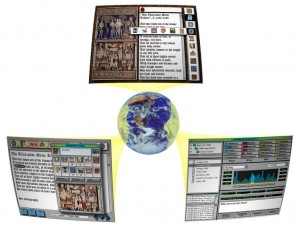 EPL is a system designed to steward and respond to learners at the level of their (as they are happening) learning needs. It includes a “Learner Interface (App)” an “Authoring Tool” and a “Learning Loop Manager” that together facilitate and manage a mutually learning oriented, ‘distributed dialogue‘ between facilitators, authors and learners.
EPL is a system designed to steward and respond to learners at the level of their (as they are happening) learning needs. It includes a “Learner Interface (App)” an “Authoring Tool” and a “Learning Loop Manager” that together facilitate and manage a mutually learning oriented, ‘distributed dialogue‘ between facilitators, authors and learners.
Learner Interface
In contrast to the notion of a ‘user’ interface, the learner interface was designed to respond to the various kinds of meaning needs that emerge when a person is learning. The original prototypes of the interface were built to run on Macintoshes. Metaphorically, the interface was a cross between an electronic book, a game machine and a Nautilus exercise machine. Subject content were like weights, the electronic book component made it easy to relate to and the game like qualities made it easy to make high speed choices between (potentially) hundreds of available options.
The principle intention of the system is to provide an environment that is responsive enough to the learner’s articulation of meaning needs that it exercises the learner’s ability to be more discriminating (disambiguating) (and trusting) of them in the first place.
Because these needs fluctuate at frequency levels we are barely conscious of, the interface was designed to provide the learner the means to choose among hundreds of situationaly relevant yet semantically/contextually related choices in an instant. This included 3 modes of interface: navigational, representational, referential.

No comments yet.